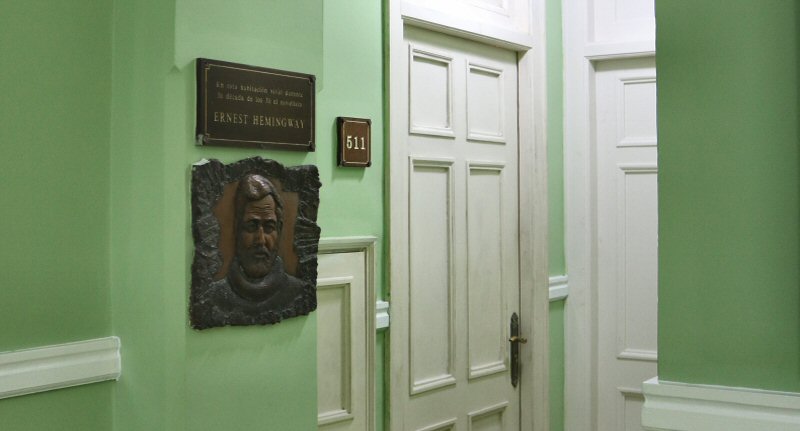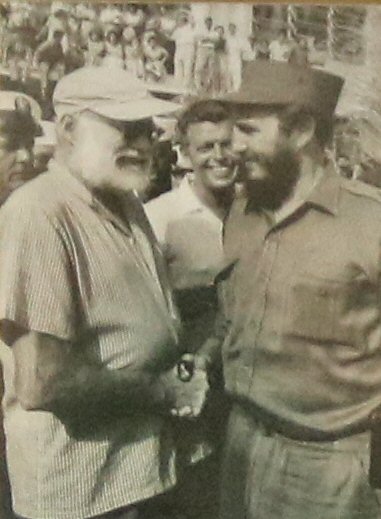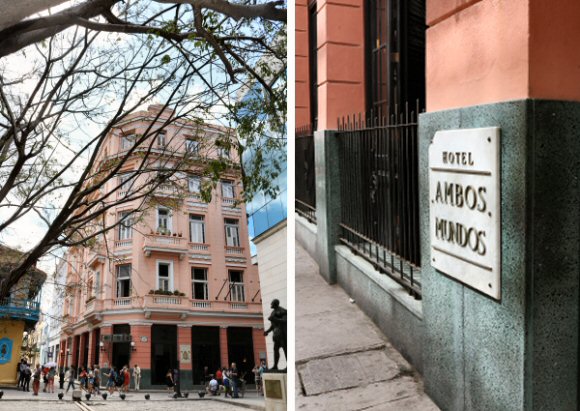Hotel Ambos Mundos, a Havana classic,
gained fame by the long stay of the writer Ernest Hemingway in
one of its rooms.
HISTORY
According to the records, in the
place of the Hotel Ambos Mundos, there was the good-looking
residence of Carlos Benitez, built in 1835. In 1842 George
Washington Halsey opened the first photo studio of Havana,
called Retratos al Daguerrotipo (Portraits to Daguerreotype) in
this building. The daguerreotype is an old photographing
technique in which the positive image is obtained from a copper
plate coated with silver iodide. In 1923, the Spanish
merchant Antolín Arias Blanco suggested to demolish it and to
construct a new building with five floors at its place that
would be destined to a modern hotel, so that the same year, the
construction of the hotel began under the direction of the
architect Luis Hernández Savio. Initially, the hotel served with
its first and second floors that had 19 rooms with private
bathrooms on each. In 1924 the hotel was expanded by the
addition of the third and fourth floors to the building. The
third floor had 18 rooms, and the fourth floor had 4 rooms and a
department for private housing.
Before the stay of Hemingway, the hotel was one of the
meeting places of the artists, writers, and musicians, i.e. of
the retail group, on every Saturday. The retail group consisted
of young people that were featuring the petty bourgeoisie. They
had achieved a national and international prestige because they
promoted the break against the cultural backwardness, existed in
Cuba, although they did not belong to any political party or
organization.
ERNEST HEMINGWAY AND HOTEL AMBOS MUNDOS
Hotel Ambos Mundos had a special place in the life of
Ernest Hemingway, as the famous writer wrote three of his
excellent works in this hotel, when he stayed during his visits
to Havana from 1932 to 1939. These are Death in the Afternoon
(1932), Green Hills of Africa (1935), and To Have and Have Not
(1937). The days that he spent in the hotel, had also great
influence on writing of his excellent work For Whom the Bell
Tolls. He wrote the first part of this novel in the room 511
(1939). He described the Hotel Ambos Mundos as “a good place to
write”. The modest room 511 of this solid, square shaped hotel
became a home and a place of study and work for the writer, and
also a hideout in general. He had discovered the Hotel Ambos
Mundos, when he had returned with his friends from a fishing
trip around Key West. Hemingway finally checked out of Hotel
Ambos Mundos in 1939, when he purchased a permanent Cuban
residence in Finca Vigia.
The room 511 is converted to a small museum now, dedicated
to the author.
ROOM 511
The room 511 that has almost a triangular shape, opens to
the city through two large windows, offering a beautiful
panoramic view of the city, so that the writer could see all the
monumental buildings of the Old Havana up to the castle complex
and the bay. The original furniture, a few ceramic plates, his
vest, his shoe etc., all have been preserved in the room. In the
center of the room, there is a small square table and a chair.
On the table lies Hemingway’s weapon, his typewriter, protected
in a glass box.
The replica of his portrait, showing him as Kid
Balzac, is hung on the wall of the small bedroom with a single
bed. This satirical painting of Hemingway was done by his good
friend and fishing companion Waldo Peirce in 1929. In Peirce's
painting, Hemingway appeared to be a slimmed-down version of
19th century French writer Honore de Balzac. Hemingway was
always comparing himself to famous writers and he probably
wanted to highlight this by doing in jest. The original is
preserved in the John F. Kennedy Presidential Library and
Museum, Boston.
In a glass cabinet
the three books that he finished in this room and some books
about the writer are exhibited.
There is usually a well-informed guide on hand to answer
any question about the days of Hemingway in Havana. Keep in mind
that at maximum four people are allowed in the room.
THE HOTEL
The walls of the lobby of the hotel are covered with photos of the writer, reflecting his colorful life. One photo on
the wall shows Ernest Hemingway and Fidel Castro shaking hands
and laughing. This photo was taken when they met for the first
time during a fishing contest held in the author’s honor in
1960. Another photo before the exit shows the author with his
third wife, Martha Gellhorn.
Beside Hemingway, there are certain other reasons to have a look at the hotel; for example, the pinkish hotel’s rooftop-garden restaurant and bar are one of the best places where the visitor can enjoy an excellent view of the historic center of the city. The original 1930s cage-elevator, quite charming, but slow, and the first floor-piano bar, which becomes quite popular at night, are the other must-see’ of the hotel.



